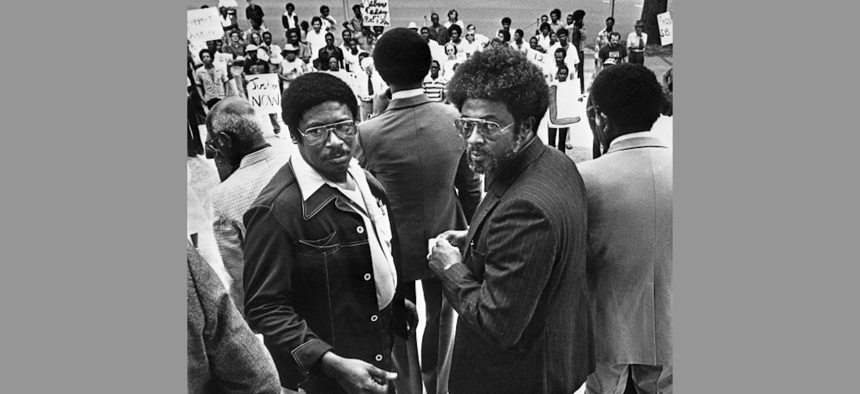Opinion
Bill Cotterell: New book looks at a Florida legal horror story
Justice took 12 years for Freddie Pitts and Wilbert Lee – if you can call it 'justice,' our Capitol Columnist writes.

Freddie Pitts and Wilbert Lee on the steps of the Old Capitol in Tallahassee, some time in 1979. State Archives of Florida
On the day in 1963 that the Rev. Dr. Martin Luther King Jr. stood on the steps of the Lincoln Memorial and made his “I Have a Dream” speech, two Black men stood before a judge in the Florida Panhandle and were sentenced to die in the electric chair for a double murder they didn’t commit.
“From Death Row to Freedom,” being published this week by University Press of Florida, is a horror story with a happy ending. Justice took 12 years for Freddie Pitts and Wilbert Lee – if you can call it “justice.”
It’s more like they escaped with their lives, due mostly to the legal work of a few determined attorneys, a courageous Miami Herald reporter, a governor who knew the ways of the Old South, and an attorney general who put politics aside and paid a price for it.
Except for anti-death penalty activists and a dwindling number of Panhandle residents, the Pitts-Lee case is largely forgotten. It doesn’t seem possible, by today’s standards, that two men could at first go from freedom to death row in four weeks.
Phil Hubbart, who represented the men for 10 years, writes a chilling and detailed account that captures not only the forensic intricacies but the social climate – mostly Old South bigotry – that made the case a legend.
His book has all the elements of a bad remake of “Cool Hand Luke,” mixed with the legal heroics of a John Grisham novel.
But this story really happened.
“The enormity of the injustice done to these petitioners is almost beyond belief,” Hubbart wrote in asking the U.S. Supreme Court to hear the case about 50 years ago. “That such an event could happen in this country in this day and age is a reminder to all of us that injustice of enormous magnitude is still very much among us.”
A white man convicted of another similar murder in Broward County admitted killing Grover Floyd and Jesse Burkett, who were abducted from a filling station in Port St. Joe on Aug. 1, 1963.
But that killer, Curtis Adams, wasn’t about to say so in a formal confession that could be used against him and put him in the chair. He was willing to testify if given immunity, but prosecutors weren’t about to reward him for ruining their flimsy case against Pitts and Lee.
The men had given coerced confessions and relied on the legal advice of a court-appointed lawyer who assured them pleading guilty and begging for mercy was their only chance for life in prison. Their death sentences came on Aug. 28, the day of the historic march on Washington.
Hubbart, who spent 12 years as a public defender in Miami and Washington and 19 as a judge on the Third District Court of Appeal, notes that King’s famous speech included a reference that “we refuse to believe that the bank of justice is bankrupt.”
But there was none that day for these men.
Miami Herald reporter Gene Miller got a tip that Adams, already doing life for the Fort Lauderdale murder of a gas station attendant, had told a lie-detector operator he’d killed the men in Gulf County.
Miller and the Herald pursued the story for years as the men got a new trial, only to be convicted again in Marianna, and were eventually pardoned by Gov. Reubin Askew and the Florida Cabinet.
Hubbart captures the tenor of the times. Pitts and Lee were called “boy” and addressed by their first names in court, which was common then.
Amid the legal tale, Hubbart includes a sharp contrast of media coverage. While the Herald crusaded to free the men, the Panama City News-Herald shamelessly flacked for local police and prosecutors.
This pretty much mirrored public presumptions: A bunch of liberal big city lawyers coming here and accusing our fine Panhandle police and prosecutors of railroading poor Blacks for killing a couple white men.
Attorney General Bob Shevin – no softie on law and order – filed a rare “confession of error” rather than contesting their appeal. But in a new trial, another all-white jury convicted them, so Askew and the Cabinet eventually set them free.
Shevin paid the price politically, losing Panhandle counties in his unsuccessful 1978 bid for governor.
Hubbart, now 86, told me “1963 was a particularly racially biased time,” but a lot has changed in 60 years. Something like the Pitts-Lee case couldn’t happen today, he said.
“There are still injustices, but we don’t have the same prejudice and bias we were confronted with then,” he said. “I don’t think you’d have the same stonewall attitude, though there’s still the endemic racism that persists in some of our institutions.”
Miller wrote his own account of the case, “Invitation to a Lynching.” The Pulitzer-winning journalist and most others involved in the case, including Pitts and Lee, died several years ago.
So why write about it now?
“There’s been some racial progress,” Hubbart said, “but I want people to remember.”
Bill Cotterell is a retired capitol reporter for United Press International and the Tallahassee Democrat. He can be reached at bcotterell@cityandstatefl.com.
NEXT STORY: Bill Cotterell: DeSantis staffers raise cash – and eyebrows
